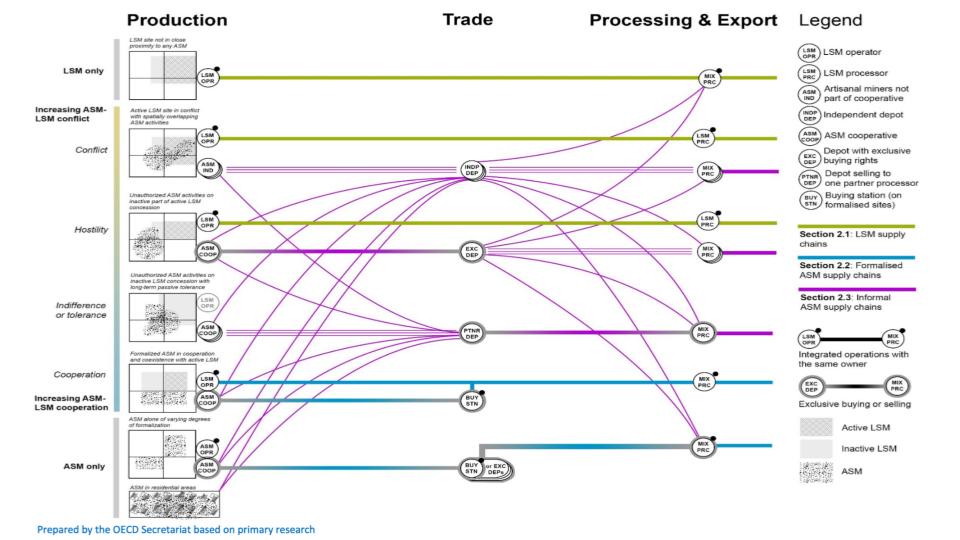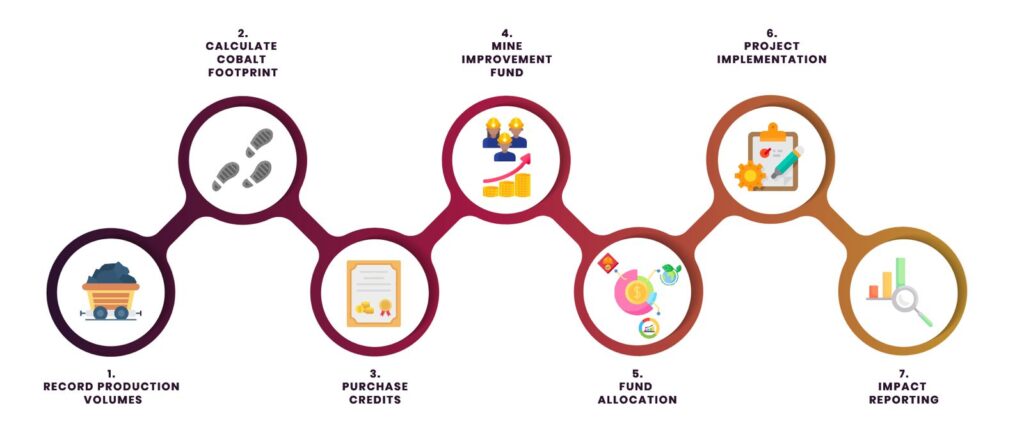Cobalt Credits: Incentivising and Enabling Responsible Artisanal Cobalt Production
For the artisanal cobalt mining sector to comply with international standards and ensure that women and men working at the mine sites operate under safe and dignified working conditions, significant investment is needed.
Recognising this need for investment, The Impact Facility (TIF), together with Fairphone and the support of various other member organisations of the Fair Cobalt Alliance, formed a Taskforce for Supply Chain Integration that has developed and launched Cobalt Credits – a ‘book and claim’ based credit system that allows downstream companies to financially contribute to improvements at artisanal mine sites committed to professionalising their operations – enabling and incentivising the responsible production of artisanal cobalt, through joint work.

Simply said, It is difficult to formally source ASM material as a downstream company
Source: OECD (2019) Interconnected supply chains: a comprehensive look at due diligence challenges and opportunities sourcing cobalt and copper from the Democratic Republic of the Congo.
Cobalt Credits represent an innovative new approach to addressing the complex issues associated with artisanal and small-scale cobalt mining, particularly in the Democratic Republic of Congo (DRC). This credit system connects downstream actors eager to ensure the supply of responsibly produced artisanal minerals, with upstream artisanal producers committed to adopting better practices, allowing downstream actors to buy credits per tonne of mined cobalt equivalent to their cobalt consumption.
Fairphone – the first to launch the purchase of credits in August 2023 with the launch of the Fairphone 5 – is a pioneer Dutch social enterprise that makes smartphones and other electronics and is dedicated to building a movement for fairer electronics, seeking to open up the supply chain and creating new relationships between people and their products. Read more about the pilot with Fairphone here.

The funds generated from the sale of Cobalt Credits are allocated according to the priorities for mine development, set by a dedicated Fund Allocation Committee (FAC), that includes miner representatives, representatives of the Women Washer’s Association, with the guidance of the FCA and the mine cooperative. The four mine-site priority areas are:
- Good governance
- Safe and dignified working conditions
- Environmental protection and,
- Inclusive economic development.
Through this model, companies can buy credits commensurate with their cobalt use and support continuous improvements that over time will enable the mine’s compliance with downstream requirements for responsible production, such as those stipulated in the ASM Cobalt Normative Framework – published by the RMI in mid-2023.
Why are Cobalt Credits needed?
Artisanal and small-scale mining (ASM) plays a vital role in supplying cobalt, accounting for approximately 5-10% of global cobalt production. However, this sector has long been plagued by hazardous working conditions, child labour, and environmental degradation. Recognising the need for immediate reform in the sector and a collective responsibility across the cobalt supply chain to address latent supply chain risks associated with artisanal and small-scale mining through co-financing the improvements needed and a collective responsibility across the cobalt supply chain to address latent supply chain risks associated with artisanal and small-scale mining through co-financing the improvements needed, even if direct physical offtake and direct physical offtake and physical integration of artisanal and small-scale mining material into global supply chains remains challenging, if not impossible for many challenging, if not impossible for many, this credit system offers verifiable assurance of good practices and impact on the ground – bridging the gap between artisanal mineral producers and the downstream users of cobalt.
How Cobalt Credits work
Cobalt Credits are issued based on actual cobalt production volumes monitored at specific FCA partner mine sites, such as the Kamilombe mine site, which is operated by the local cooperative CMDS.
Downstream companies in the cobalt supply chain can determine their cobalt footprint – the amount of cobalt used in their products – and subsequently decide how many Cobalt Credits they wish to acquire. Based on this, they are allowed to make certain claims around how their cobalt use contributes to improving conditions in artisanal and small-scale mining production.
Companies purchase Cobalt Credits, each representing one tonne of cobalt produced by a responsible local partner cooperative, like CMDS.
The Fair Cobalt Alliance, through The Impact Facility, collaborates with a local Fund Allocation Committee, comprising representatives of different groups of workers active at the mine site, to invest the funds generated from Cobalt Credit purchases. These funds are directed towards projects addressing critical improvement areas, including Health and Safety, Child Rights Protection, Cooperative Governance, and Environmental Protection.
Participating companies receive detailed reports showcasing the tangible social, environmental, and economic improvements taking place within the supported mining cooperative and its community. This transparency ensures that companies can witness the impact of their investments firsthand.

Why Companies Should Support Cobalt Credits
Cobalt Credits allow companies to proactively address the issues of hazardous working conditions, child labour, and environmental degradation within the cobalt supply chain. By supporting responsible production, companies can contribute to meaningful social change and improve the livelihoods of those involved in artisanal and small-scale mining.
Investing in RCCs aligns seamlessly with a company’s Environmental, Social, and Governance (ESG) strategy. It enables companies to create a positive social and environmental impact right at the outset of their supply chain – commensurate with their cobalt footprint. Detailed reports on fund utilisation provide insights into how their investments are contributing to improved ESG performance.
Supporting responsible cobalt production does not necessitate altering existing supply chain structures or changing suppliers. Companies can encourage informal, artisanal mines to professionalise their practices while maintaining their current operations.
When purchasing Cobalt Credits, companies do not incur additional traceability or logistical costs. Every investment made goes directly towards transforming the artisanal and small-scale mining cobalt sector and fostering positive change.
Companies that invest in Cobalt Credits benefit from periodic reports that highlight the social, environmental, and economic improvements achieved by artisanal mining organisations and their communities. The Impact Facility, as the legal entity operating the Cobalt Credit scheme, manages the RMC fund and participates in the Fund Allocation Committee through its local staff, and is responsible for reporting to all parties involved on both finances and the impact achieved through the approved mine improvement projects. An annual third-party audit provides additional assurance that the funds have been spent accountably.
One year after the launch of the pilot, The FCA team published an update on the mechanism and the project’s supported with the initial purchase of credits from Fairphone. Click the button below for more information.
How to join the Cobalt Credits scheme
To find out more about Cobalt Credits, download this overview slide deck or get in touch.
Click here